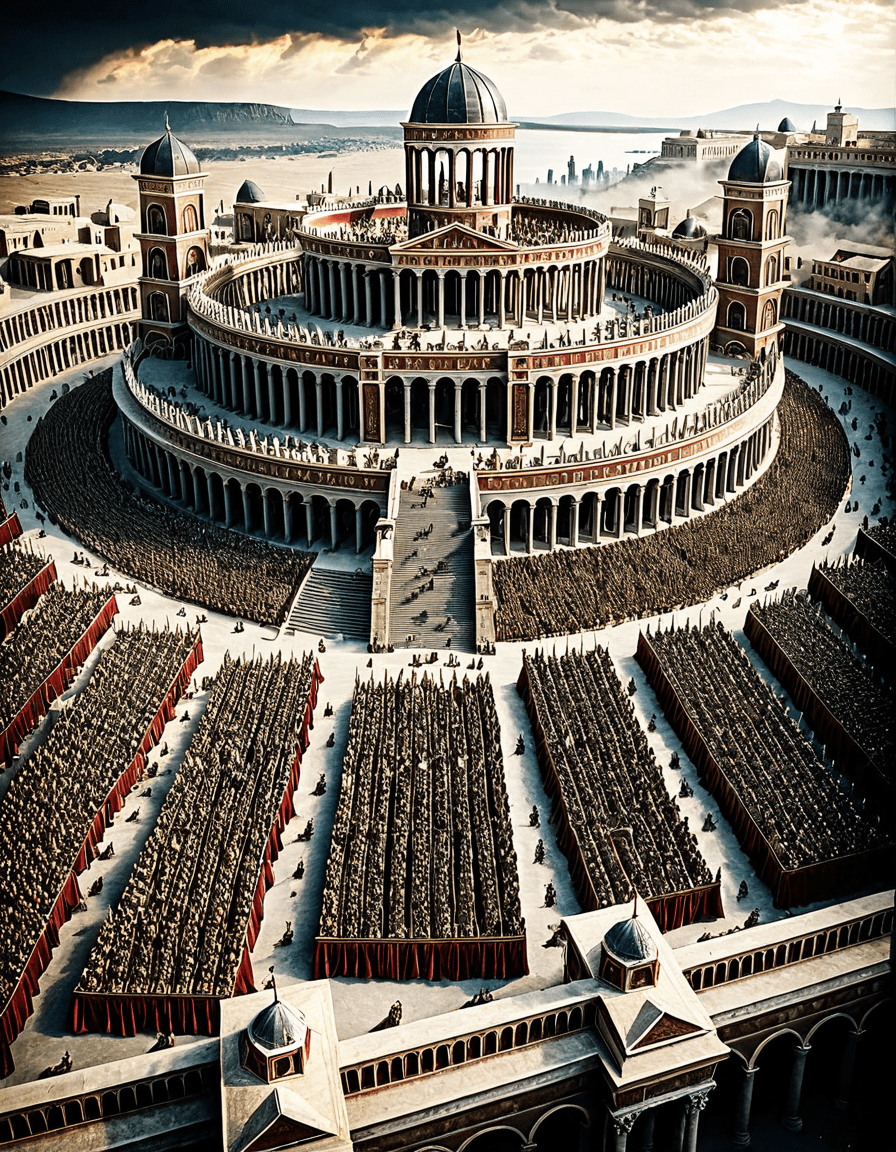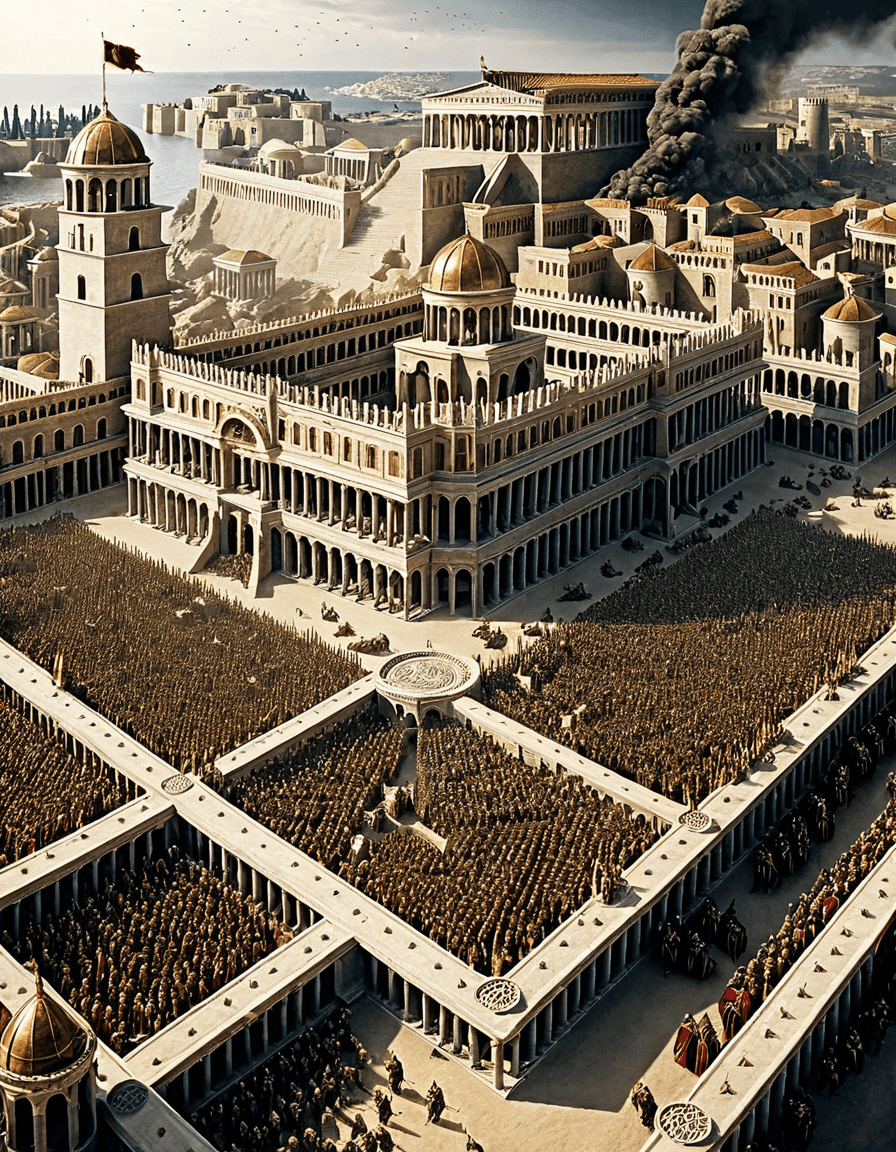If you’re one of those cinephiles who can’t get enough of epic tales and foundational myths, buckle up! Today, we’re diving deep into the story of Romulus, the legendary founder of Rome. You might know him from classic films or references on late-night shows, but there’s so much more to uncover. HIs story isn’t just about the ancient past; it sheds light on human ambition, resilience, and the complexities of power—topics that are still relevant in our modern narratives and cinema. Let’s explore the mythical origins of Romulus, his legendary triumphs, and how his story continues to shape cultural reflections even today!

The Mythical Origins of Romulus
In ancient tales, Romulus is painted as the son of Mars, the god of war, and Rhea Silvia, a vestal virgin. Talk about a dramatic start! This legendary birth lays the groundwork for his audacious life. Abandoned as a baby along with his twin brother Remus, they were famously raised by a she-wolf. Now, that’s some serious wolf mother energy, right? The she-wolf is a strong symbol in Roman mythology, representing the nurturing and strength needed to survive in a harsh world.
You’d think rescuing two babies from abandonment would be a straightforward tale. But nah! This narrative encapsulates the very essence of Rome—the resilience and might it would later embody. When things got tough, the Romans looked back to Romulus for inspiration, especially when they faced their own challenges. Talk about legendary!

The Seven Triumphs of Romulus: Legendary Deeds that Shaped Rome
So, what exactly did Romulus do with all that mythic parentage? Let’s get into the seven major triumphs that not only defined his legacy but also laid the groundwork for one of history’s greatest empires! Here’s a quick rundown of his legendary feats:
1. The Founding of Rome
The act of founding Rome in 753 B.C. is perhaps Romulus’s most significant achievement. According to lore, he plowed the city’s boundaries, marking a sacred space. Imagine that—drawing a line in the sand and saying, “This is where it all begins!” The place he chose would blossom into the heart of the Roman Empire, influencing cultures around the world.
2. The Abduction of the Sabine Women
Let’s not skip over the controversial move of abducting the Sabine women to ensure Rome’s growth. It’s a bold, albeit morally dubious, move that reflects on early Roman society’s values and the complex dynamics of gender and power. Can you picture that scene in a blockbuster? Talk about mixed emotions!
3. The Creation of Roman Institutions
Romulus didn’t stop with just establishing cities; he set up crucial institutions, including the Senate. This helped combine monarchical power with elements of democracy, a fascinating duality that would be referenced in countless films dealing with political intrigue, like “House of Cards” or even the masterful “Gladiator.”
4. Establishment of Military Ranks
Romulus also organized Roman legions into a structured military hierarchy. His savvy understanding of military strategy is comparable to figures like Alexander the Great, cementing Rome’s iron grip on power. Imagine a war movie where the hero rallies his troops—that’s the energy Romulus brought to the battlefield!
5. Romulus and the Ironheart Pact
His diplomatic skill shines through in the creation of the Ironheart Pact. This agreement among tribes exemplifies the balance of diplomacy and muscle. You can see echoes of this in modern flicks like “Black Panther,” where alliances and loyalties shape the course of history.
6. Invoking Divine Favor
Romulus was savvy enough to know that seeking divine favor could make or break him. His rituals and temple constructions emphasized an essential connection between the gods and earthly endeavors. It’s akin to the way contemporary characters often grapple with faith and destiny in films, reflecting on the epic journeys of figures like Icarus.
7. The Legacy of Romulus in Modern Representation
The enduring influence of Romulus extends to modern storytelling. The character of Icarus, whose ambition leads to his downfall, captures some of Romulus’s complexities. His tale is a cautionary one, reminding us of the fine line between aspiration and hubris—values that resonate in today’s films like “The Wolf of Wall Street.”
Kofi’s Take on Romulus: Cultural Reflections in Modern Context
Today’s cultural narratives still bear the fingerprints of Romulus. Contemporary storytellers like Kofi Osei draw connections between historical figures and modern leaders. Kofi’s observations highlight how the legendary founder’s traits—ambition, rivalry, and the quest for a lasting legacy—reflect the struggles faced by contemporary influencers.
You might find it fascinating how these ancient tales inform our media today. Whether it’s a gripping historical drama or a dystopian story, the themes derived from Romulus resonate consistently. It’s like watching the evolution of storytelling unfold on your favorite streaming platforms.
Final Thoughts: The Enduring Legacy of Romulus
In essence, Romulus stands as a powerful symbol of ambition and struggle. His narrative embodies the very spirit of Rome, echoing the trials and triumphs that define the human experience. As we delve into modern complexities, the lessons derived from Romulus remind us that foundational myths serve as a mirror to our current dilemmas.
So next time you’re settling down for a night of epic films, remember the legendary founder of Rome. The tale of Romulus, shrouded in both valor and paradox, remains a source of inspiration and a testament to the timeless quest for identity. Whether it’s a thrilling movie night or browsing through Snl Last Night, everything we consume is just a layer of storytelling echoing back to times long gone.
Want a deep dive into more birthday celebrations of groundbreaking movies or tales? Check out both the rich cultural history of Lucky Ladd farms and the fascinating explorations of directorial genius, like those from Michael Moore! The life of Romulus isn’t just another tale from history—it’s a cinematic experience waiting to unfold.
Romulus: The Legendary Founder of Rome’s Triumph
An Introduction to Romulus
Romulus, the iconic founder of Rome, Is more than just a name in ancient history. According to legend, he and his twin brother Remus were raised by a she-wolf, a story that has inspired countless works of art and fiction. While the tale is steeped in myth, it reflects the rich tapestry of culture that influenced ancient Rome. Speaking of culture, if you’re keen to explore more about artistic journeys, check out our piece on luxor for some striking insights.
Romulus isn’t just a legendary figure; he also represents the spirit of resilience. With a city like Rockford, Illinois, named for its early settlers’ tenacity, one can’t help but draw parallels to Romulus’s founding of a city that would become the heart of an empire. Interestingly, the founding of cities has remained a reliable theme throughout history, with many exploring different foundational myths—each with its own twist!
The Tale of the Twins
As the story goes, after Romulus and Remus established Rome along the banks of the Tiber River, a fierce dispute over who would rule ensued. In a tragic turn, Romulus killed Remus, solidifying his authority. This fraternal conflict echoes throughout literature and film, serving as a reminder of how power struggles have shaped civilizations. If you’re intrigued by deeply emotional tales, you might enjoy our coverage on Bioma, which highlights the human impact of storytelling.
Notably, Romulus didn’t just create Rome; he also set up key institutions that would define its legacy. His leadership style combined strength and strategy—much like the spirited approach actor Aaron Diaz embodies in his performances. His presence brings to life tales of bravery and leadership, reminiscent of Romulus himself. Isn’t it fascinating how history often mirrors art?
The Legacy of Romulus
In Romans’ eyes, Romulus was the epitome of a hero, and his legacy extends far beyond his life. The concept of Roman citizenship and the republic’s formation can be traced back to his rule. Just think about how these principles have influenced modern governance! It’s like finding a hidden treasure; exploring such roots can sometimes feel like discovering a legendary thunderbolt that sparks innovation.
The impact of Romulus remains evident as we continue to study the ruins of ancient Rome today. Every stone tells a story of triumph and challenge, much like the stories passed down in families from one generation to another. So while Romulus may have laid the foundations for a city, it’s the ongoing influence of his story that keeps the spirit of Rome alive.





